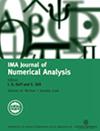非连续最小二乘有限元方法的尺度鲁棒后验误差估计
IF 2.4
2区 数学
Q1 MATHEMATICS, APPLIED
引用次数: 0
摘要
最小二乘有限元法的一个令人信服的特点是对任意一致性离散化都内置了后验误差估计。为了将这一性质推广到不连续有限元解析函数中,本文以具有混合边界条件的泊松模型问题为例,介绍了分段Sobolev函数的最小二乘原理。它允许相当一般的离散化,包括三角和多边形网格上的标准分段多项式ansatz空间。该方法通过附加最小二乘残差来增强分段多项式的元间连续性。通量变量的正态跳变的侧条件要求一个消失的积分平均值,并允许用最小二乘泛函中网格尺寸的自然幂对跳变进行惩罚。这避免了对精确解的额外正则性假设的过度惩罚,这通常出现在关于不连续LSFEM的文献中。给出了过度惩罚方案的内建后验误差估计的证明。通过对最小二乘泛函中残差的适当加权,保证了本文所有结果在域的大小方面具有鲁棒性。数值实验证明了所提出的权重的重要性,并展示了自适应网格细化算法在不同多项式度下的最佳收敛速度。本文章由计算机程序翻译,如有差异,请以英文原文为准。
Scaling-robust built-in a posteriori error estimation for discontinuous least-squares finite element methods
A convincing feature of least-squares finite element methods is the built-in a posteriori error estimator for any conforming discretization. In order to generalize this property to discontinuous finite element ansatz functions, this paper introduces a least-squares principle on piecewise Sobolev functions by the example of the Poisson model problem with mixed boundary conditions. It allows for fairly general discretizations including standard piecewise polynomial ansatz spaces on triangular and polygonal meshes. The presented scheme enforces the interelement continuity of the piecewise polynomials by additional least-squares residuals. A side condition on the normal jumps of the flux variable requires a vanishing integral mean and enables the penalization of the jump with the natural power of the mesh size in the least-squares functional. This avoids over-penalization with additional regularity assumptions on the exact solution as usually present in the literature on discontinuous LSFEM. The proof of the built-in a posteriori error estimation for the over-penalized scheme is presented as well. All results in this paper are robust with respect to the size of the domain guaranteed by a suitable weighting of the residuals in the least-squares functional. Numerical experiments illustrate the importance of the proposed weighting and exhibit optimal convergence rates of the adaptive mesh-refining algorithm for various polynomial degrees.
求助全文
通过发布文献求助,成功后即可免费获取论文全文。
去求助
来源期刊
CiteScore
5.30
自引率
4.80%
发文量
79
审稿时长
6-12 weeks
期刊介绍:
The IMA Journal of Numerical Analysis (IMAJNA) publishes original contributions to all fields of numerical analysis; articles will be accepted which treat the theory, development or use of practical algorithms and interactions between these aspects. Occasional survey articles are also published.

 求助内容:
求助内容: 应助结果提醒方式:
应助结果提醒方式:


